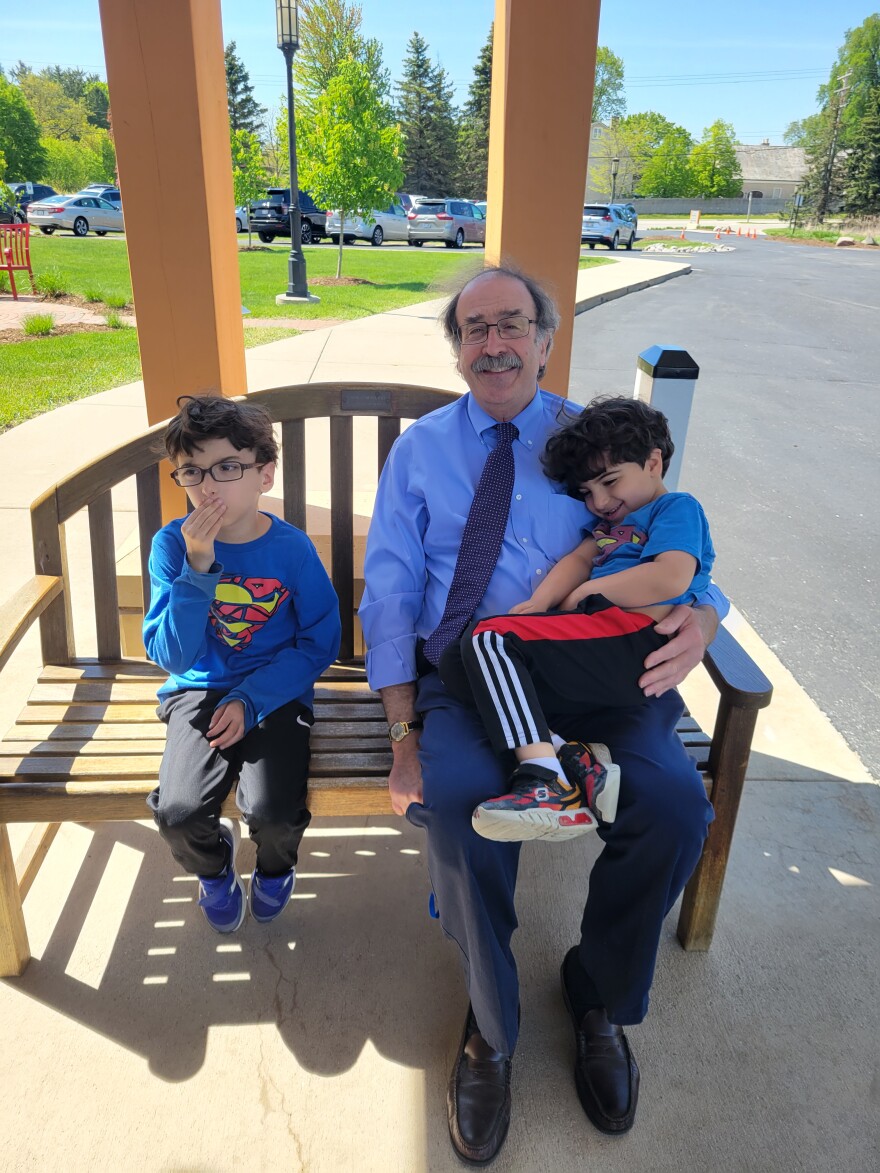Giving to help the community is a central tenet of Judaism, whether that’s giving of your time, your resources or your services.
To celebrate Jewish-American Heritage Month, WUWM visited a “Mitzvah Day” at a local synagogue. It coincided with a donation collection by Jewish social service organization Tikkun Ha-Ir.
To find out what a “mitzvah” is, ask Ezra. The 9-year-old grandson of Emanu-El B’ne Jeshurun rabbi Marc Berkson was at Mitzvah Day with his 6-year-old brother Isaac. “I know the translation mitzvah means a good deed,” he says.

It also means a commandment — interjects Rabbi Berkson after asking Ezra for additional meanings. Ezra was undeterred: “There are 613 mitzvot.” Mitzvot are the plural of mitzvah. When asked if he had done all of them, Ezra laughed and said no.
Emanu-El is a flurry of activity. In a big room, people of different ages, from young kids like Ezra to people their grandparents’ ages are making snack packs for Hunger Task Force to provide to kids in the parks.
Also, as organizer Reenie Kavalar explains: "We're making 'no sew' blankets for the Milwaukee Rescue Mission, the Women's House, we're making Band-Aid cards so that the clergy can take them with them when they do their hospital visits. And on the far table, we are making birthday bags that will go to the Jewish Community Pantry."
At the same time, organizers through Tikkun Ha-Ir are running what they call the “glean machine.” Cars have been driving up all morning dropping off items to donate for the social justice group.
Rabbi Berkson says its focus on “gleaning” is based on a biblical commandment. During harvest time, Leviticus tells people to leave the corners of the fields and all the gleanings for those who are hungry. “And so we said, you know, we got to find some way that we can jointly gather stuff, most of us don't have farm fields anymore, but we have lots of stuff that we can pass on to others.”

Around noon, people have brought in piles and piles of items. Rhonda Lindner and Nikki Levine are loading up white plastic bags full of women’s clothing into Levine’s Subaru. Lindner is Jewish Education & WIVEC Interfaith Organizer for Tikkun Ha-Ir.
“We’re hoping that the clothing will help people have a wardrobe so that when they're ready to take the next step for job interviews and such that they'll have the proper attire and the look, they'll look very professional as they walk into an interview,” says Lindner.
She reports there are 50 more bags in the synagogue.
Tikkun Ha-Ir translates to “repair the city.” The organization is supported by Jewish institutions around the area, from orthodox to reform synagogues to Jewish schools. It has been around for 20 years. Rabbi Berkson was one of the original founders.
“Tikkun Ha-Ir grew out of a joint project we did when Emanu-El was still on Kenwood [on Milwaukee’s east side]. And we were doing to something jointly with Hillel. And also with Lake Park synagogue,” says Berkson.
An important speaker was coming to town, and the groups: an orthodox synagogue, a reform congregation and a student group, all decided they would like to learn together. The groups eventually joined together for a joint program and Shabbat dinner.
Afterward, according to Berkson, "Lou Friedland, who was a member of our congregation at the time, said, 'We don't want this to end. We have to find ways that we can learn together. And we can, in a sense, engage ourselves back within the framework of the entire city of Milwaukee.'" Berkson says Tikkun Ha-Ir originated out of that desire to turn learning into action.
Lindner says working for Tikkun Ha-Ir has been the experience of a lifetime for her and her family. “My husband is very social justice oriented,” she says. “And my children are adult children. And they've really seen how my husband and I are modeling, you know, the beliefs of Tikkun Ha-Ir and we're walking the walk.”

In its mission to repair the city, Tikkun Ha-Ir is based on four guiding values: "It is chesed, which is kindness. Kehilla, which is community. Tzedakah, which is service and philanthropy, and Tzedek, which is equity. So everything that we do at Tikkun Ha-Ir I try to place into those four mindsets and values."
Many more donated items are inside. A coat closet is one of the storage spots. “So here are kitchen items for families who are moving maybe from a shelter into their first home in a while as well as to help refugee communities who are coming here with nothing.” The collections include plates and other kitchen gear, including a salad shaker.
“Every vegetable counts!” says Lindner enthusiastically. “Especially at Tikkun Ha-Ir.” She is referring to the prominent role of food justice in Tikkun Ha-Ir’s efforts. It helps farmers markets and gardeners donate their extra vegetables to places where there’s a deficit. It also runs a “veggie chop shop” where volunteers turn the extra vegetables into meals.
Tikkun Ha-Ir will be hosting a Food Justice Walk on Sunday June 4th to help fund these efforts.
_


